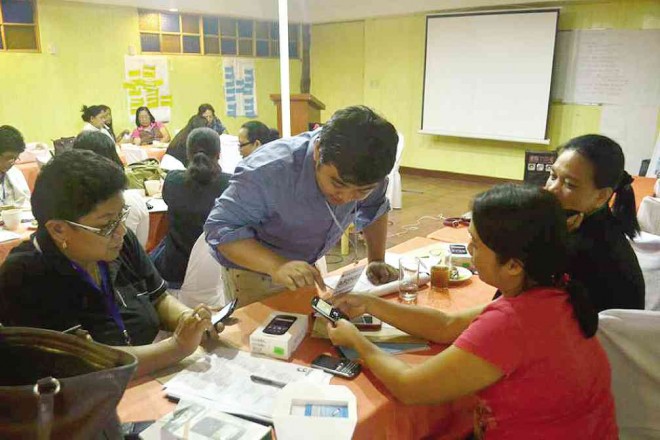Bid for better health gives birth to app

HEALTH workers at Malungon Rural Health Unit during a training session on rCHITS in Sarangani province last month PHOTO FROM RCHITS FACEBOOK PAGE
Midwives in the country have been on the front line of providing basic maternity and child health services.
They lack access to health information and resources, and patients visited by these health workers are unreported.
Now, a mobile phone application supported by an online system, offers access to information at the tap of a screen or click of a phone button.
The application, developed by a Filipino, Rene James Balandra Jr., offers an integrated mobile technology to health workers that can deliver real-time data reporting across the country.
Created through the efforts of the United Nations Children’s Fund (Unicef) and the University of the Philippines (UP) Manila National Telehealth Center, rCHITS, or real-time monitoring of maternal and child health indicators through the Community Health Information Tracking System, aims to reinforce health information systems by providing quick reporting of key indicators.
Health workers can now send actual reports of every case they handle through the application, which utilizes the short messaging service (SMS).
Pilot areas
The pilot rCHITS was tested from November 2011 to May 2012 in Gamay, Northern Samar; Sto. Domingo, Albay; and Glan, Sarangani.
The second rCHITS, or rCHITS2, which was launched this month, has expanded to 10 sites including the towns of Lebak and Kalamansig in Sultan Kudarat; Malungon town in Sarangani; the towns of Aleosan, Arakan, Midsayap and President Roxas in the province of North Cotabato; Puerto Princesa City; Davao City and Quezon City.
Communications firm Globe Telecom, one of the project partners, donated hundreds of Android phones and one-year worth of prepaid load for the implementation of the program.
Tomoo Hozumi, Unicef country representative, said providing real-time information addressed the need for results and accountability in the country and across the world.
“Globally and in the Philippines more than ever, there is a demand for results and accountability. Efforts to make the health system more efficient, more transparent and more responsive to information needs directly address that demand,” said Hozumi in a speech read by Dr. Daniella Castillo, Unicef Philippines health specialist.
Let persons exist
“To deliver services meaningfully and inclusively, we need to make every person exist in our client lists. To be held accountable and be properly credited for services rendered, a record needs to be made of all contacts between families and health workers,” Hozumi added.
After the local health workers text or send their report, it will automatically be collated and included in previous reports and will immediately appear on the LGU Dashboard which is a “graphical user interface that can be accessed through the web which allows local chief executives to see the health status of his/her respective community or barangay.”
“All these in a way that facilitates, and not encumbers your daily workload. And for these data to reach health decision-makers such as your mayors and the local health boards, so that their plans and budgets become more timely and responsive to your needs,” Hozumi said.
Sheila Pregonta, a midwife from the farming town of President Roxas in North Cotabato, agreed that reporting would be faster and it would help ease their work load aside from facilitating requests for additional funds.
“It can help us with our reporting. This time, it is faster because it is in real-time. We do not have to wait for a month just for the reporting,” Pregonta said.
“Our mayor can now see data which are faster and more reliable,” she added.
LGU roles
Dr. Portia Fernandez-Marcelo, director of UP Manila National Telehealth Center, said they were very interested to see how the mayors of the selected towns would utilize the real-time data.
“The idea is how will the mayor use the information in decision making?” Marcelo said.
Marcelo said they were also curious about how the project would be sustained even after the grant.
“If the mayor sees its need, maybe the LGU can continue [the program],” Marcelo said.
She added that majority of the selected areas were impoverished and were very difficult to reach.
The midwives in the selected areas said they, too, were excited about having access to technology and information.
Pregonta said using the technology might be quite tricky for those who were not familiar with Android phones.
“For those who use Android phones, it is pretty easy. But for those who are new in using this device, it can be easily learned,” Pregonta said.














